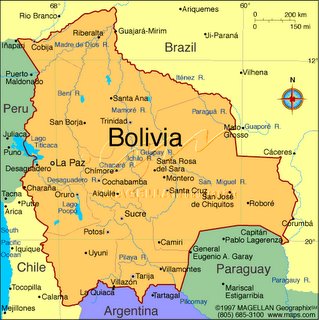South American Resource Wars

China Moves In
U.S. rivals eye Bolivian gas, minerals
WORLD BRIEFINGS By Martin Arostegui THE WASHINGTON TIMES January 24, 2006
SANTA CRUZ, Bolivia State enterprises from Venezuela and China are signing agreements with Bolivia's new leftist government to develop Bolivia's hydrocarbon and mineral resources, according to diplomats and spokesmen for Bolivia's ruling Movement for Socialism (MAS). A $1.5 billion investment by Chinese energy giant Sinopac for gas fields in eastern Bolivia is going ahead, according to Chinese Embassy officials who say the bid, first made over a year ago, was blocked until now by "political and administrative complications." Sinopac made a deposit for the project after a visit to Bolivia last year by Chinese energy executives. New investments were among the main topics discussed during a visit to Beijing last week by Bolivian President Evo Morales, who was sworn into office on Sunday after campaigning on a promise to nationalize his country's energy resources. Mining ventures in Bolivia also are being considered by China, which already controls much of the iron production in Peru and is planning to build steel plants in Brazil. A consortium of companies from India and China is among five groups bidding on a $5 billion project to develop Bolivia's iron-ore deposits at El Mutun, according to confidential documents shown to The Washington Times. El Mutun, in eastern Bolivia, is believed to contain the largest iron-ore deposits in Latin America, and the third-largest in the world. Officials of Bolivia's mining ministry said development of El Mutun has been held up by the need for major investments on infrastructure. A railroad must be built to connect the mine with Port Busch on the Paraguay River, where new facilities need to be installed for barges to carry the iron to the Atlantic
Ocean. "There are Chinese companies currently investigating projects in mining. But it's very complicated. It's a very big investment," said a Chinese diplomat in Santa Cruz. There are also political complications. Local business interests favor other foreign companies bidding for the project, including Britain's Rio Tinto Zinc and private Brazilian and Argentine firms. Arturo Medivil, a Santa Cruz lawyer and radio talk-show host, warns that competition for El Mutun could set off an explosion of separatism in eastern Bolivia, which supported the right-wing Podemos party in the December elections and elected independent governors favoring regional autonomy.






1 Comments:
Morales purges Bolivian military after missile saga
Tue Jan 24, 2006 9:08 PM GMT
LA PAZ, Bolivia (Reuters) - Bolivian President Evo Morales reshuffled the military high command on Tuesday, stamping his authority on a top brass badly tarnished by a scandal over the destruction of Bolivian missiles in the United States.
Shouts of protest from the daughter of a general under investigation for the scandal interrupted a tense ceremony in which dozens of senior military men were replaced, two days after leftist Morales took office as the Andean country's first indigenous president.
"I regret the information we've been receiving for months about the disarming of the armed forces. I haven't taken any action against members of the armed forces, only against the leaders. Now is the time to investigate," said Morales before swearing in the new military and police chiefs.
At the height of campaigning for the December 18 election that he went on to win, Morales denounced irregularities in the transfer of the country's only missiles to the United States for disposal -- fuelling anti-U.S. sentiment in impoverished Bolivia and raising concerns the government had little control over the military.
An estimated 30 Chinese-made surface-to-air missiles were destroyed in October.
The scandal prompted Morales's predecessor to sack the head of the army and put several generals under investigation.
The former army chief had told local media Washington pushed for the destruction of the weapons because it feared Morales would win December's presidential poll. He retracted his comments soon afterward.
A government report said the missiles were earmarked for disposal because they were obsolete.
Washington is wary of Morales, a former coca farmer who has resisted its coca eradication policy in Bolivia, the world's third-largest cocaine producer.
Analysts said Morales was keen to assert his control over the armed forces, who have respected government authority since democracy returned in 1982 but have had a controversial role in quashing street protests in recent years.
"After the whole missiles affair, the high command was left seriously discredited," said a political analyst, who asked not to be named. "There's no risk in what the president has done because he has a big margin for action, he has backing."
Morales named a new commander-in-chief of the armed forces as well as new chiefs of the army, air force, navy and police. His designation of a more junior general as head of the army forced several more senior generals into retirement.
But in the first moment of tension since Morales' inauguration, the daughter of one of the dismissed generals shouted "It's not justice" as the names of the new chiefs were being read out in Tuesday's ceremony.
http://today.reuters.co.uk/news/newsArticle.aspx?type=worldNews&storyID=2006-01-24T210836Z_01_N24169908_RTRUKOC_0_UK-BOLIVIA-MILITARY.xml&archived=False
By hope2endure, at 10:46 AM
hope2endure, at 10:46 AM
Post a Comment
<< Home